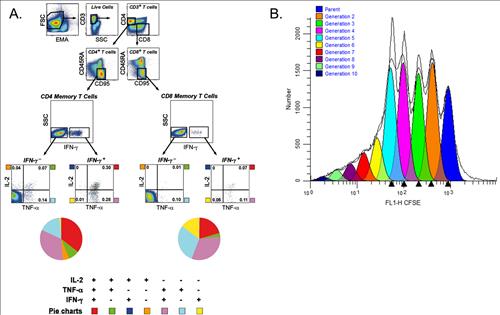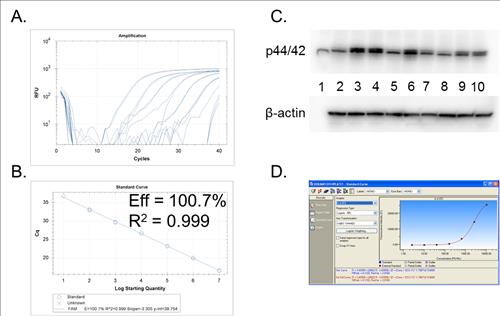CARC Analytical Core
>Director: Liz Simon, PhD
Email: lsimo2@lsuhsc.edu
Phone: 504.568.3395
Co-Director: Robert Siggins, PhD
Email: rsiggi@lsuhsc.edu
Phone: 504.568.2045
Lab Manager: Patrick McTernan, PhD
Email: pmcter@lsuhsc.edu
The CARC Analytical Core has 3100 sq. ft. of modern laboratory space on the 3rd floor of the Clinical Sciences Research Building (CSRB) of the LSU Health Sciences Center in New Orleans, where experiments and analyses proposed in the different Research Components and Pilot Projects are performed. The Analytical Core is a multidisciplinary Core that consists of a Flow cytometry, Molecular Biology/Analytical and Cell Culture Laboratories dedicated to support SIV/HIV/alcohol research. The laboratories are fully equipped with fume hoods, air, gas and vacuum lines. Water is purified centrally and run through Millipore ion exchange and activated carbon beds in the laboratories. Additional laboratory space (approximately 2800 sq. ft. at LSUHSC) holds additional equipment that will be used by the proposed studies and shared with other faculty members.
Flow Cytometry Laboratory
Technical Director: Constance Porretta, BS, I(ASCP)
Email: cporre@lsuhsc.edu
Phone: 504.568.4222
The Flow Cytometry Laboratory is instrumented with 3 cell sorters and 2 analysis cytometers with high throughput sampling capacity. Our cell sorters have a maximum of 15 fluorophore detection capacity, and the analyzers have a maximum of 18 fluorophore detection capacity. We routinely perform polychromatic cell analysis and sorting, immunophenotyping, intracellular and functional markers, cytometric bead array assays, DNA ploidy, cell cycle, and proliferation analysis. Our laboratory offers in-house training and remote access to analysis programs such as FlowJo, Diva, FCAP, and Modfit.

- Antigen-specific T cell phenotyping, cytokine production, and SPICE analysis.
- CFSE analysis of proliferating cells over 10 cell divisions.
Molecular Biology/Analytical Laboratory
Technical Director: Jasmine Hall, BS
Email: jhal18@lsuhsc.edu
Phone: 504.568.7879
The Molecular Biology/Analytical Laboratory is a state-of-the-art facility capable of performing most major molecular biology techniques. Examples of our capabilities include gene cloning, RT-qPCR and standard curve generation, Western blot analysis, ELISA, ELISPOT, Multiplex protein arrays, and DNA methylation activity assays. Development of mRNA semi-quantification using Multiplex technology on fixed, permeablized flow-sorted cells is among our current innovation.

- RT-qPCR standard curve amplification plots for SIVgag.
- Plotted standard curve of SIVgag has 100.7% efficiency and an R2 value of 0.999
- Western blot analysis of phosphorylated p42/44 MAP kinase. (1) Marker, (2) Saline ip/D5W it, (3) Saline ip/G-CSF it, (4) Alcohol ip/ G-CSF it, (5) Saline ip/D5W it, (6) Saline ip/G-CSF it, (7) Alcohol ip/ G-CSF it, (8) Saline ip/D5W it, (9) Saline ip/G-CSF it, (10) Alcohol ip/ G-CSF it
- Mutiplex standard curve for IL-6 analysis.
Cell Culture Laboratory
Technical Director: Rhonda Martinez, BS
Email: rmarti2@lsuhsc.edu
The Cell Culture Laboratory is a specialized BSL-2 facility equipped to handle samples obtained from both human tissues and rhesus macaques. Additional laboratory space is dedicated to the culture and analysis of cell lines and primary cells from other non-primate model organisms. Techniques commonly used in the laboratory include in vitro PBMC stimulation for downstream assays, isolation of primary bone marrow mesenchymal stromal cells from rhesus macaques, in vitro SIV/HIV infectivity assays, and time-lapse microscopy of living in vitro cultures in a humidified and heated stage microscope. We are currently developing lentiviral shRNA delivery systems to prepare customized knockdown capability to CARC investigators.
Technician: Bryant Autin, MS bautin@lsuhsc.edu
Animal Laboratory
Larry Coleman, BS
Heather McGarrah, BS
The objective of the CARC Animal Laboratory is to design and implement nonhuman primate (NHP) studies to understand alcohol-induced mechanisms on biological and health outcomes in both SIV+ and SIV- groups. The rationale is that the rhesus macaque model of SIV infection is recognized as the premier preclinical model for studying pathogenesis and treatment of HIV because of its similarities to HIV/AIDS. It will help in the bidirectional translational approach to identify potential mechanisms and interventions of comorbidities in HIV. CARC has performed appropriately powered longitudinal studies on over 250 NHPs receiving alcohol or vehicle. The CARC leadership recognizes that NHP are a precious resource, demanding careful consideration of study design to maximize results from these costly and time-consuming studies. We also recognize that studies in NHPs require significant resources, specialized facilities, and technical expertise not present at most institutions. The experience gained by CARC scientists using this innovative model makes us unique in the scientific community and a national resource for studying biomedical consequences of alcohol consumption on HIV. The CARC Animal Laboratory works in close conjuction with the LSUHSC Division of Animal Care and adheres to all Institutional Animal Care and Use Committee (IACUC) principles and guidelines.
